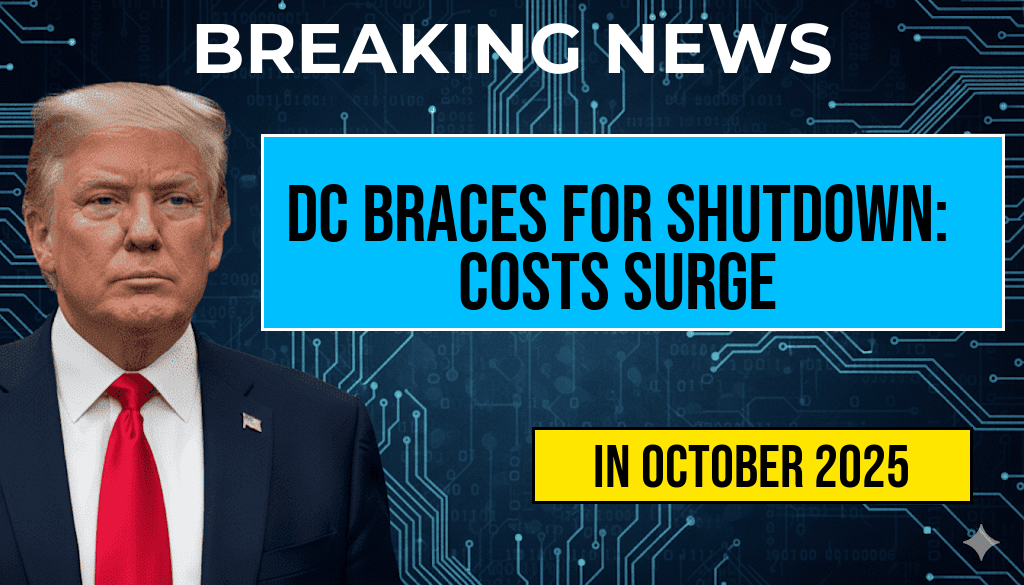As the threat of a government shutdown looms over the Washington, D.C. region, families and commuters brace for significant financial strain. With a potential halt in federal operations, child-care costs are expected to soar, and commute expenses are likely to rise sharply. Federal employees and contractors face the prospect of unpaid leave, impacting local economies and increasing the burden on families who rely on affordable child care and public transportation. The ripple effects of this impending shutdown could transform the economic landscape in the area, leading to heightened concerns about budgetary constraints for households already navigating inflationary pressures.
Impact on Child-Care Costs
Child-care facilities across the D.C. region are bracing for an influx of children as parents adjust their work schedules due to potential government furloughs. Many providers are already reporting an increase in enrollment, particularly for families needing temporary care solutions. Experts predict that this surge could lead to inflated prices for child care services.
Current Child-Care Rates
| Age Group | Average Monthly Cost |
|---|---|
| Infants | $1,500 |
| Toddlers | $1,200 |
| Preschoolers | $1,000 |
With the average monthly cost for infant care exceeding $1,500, many families are already feeling the pinch of high expenses. According to the Child Care Aware of America, D.C. families spend an average of 20% of their income on child care, a figure that could rise dramatically if demand continues to outpace supply during a shutdown.
Rising Commute Expenses
Commuters in the D.C. area face additional challenges as the potential government shutdown approaches. Public transportation systems, including Metro and local bus services, are already experiencing strain due to increased ridership. With many federal employees potentially out of work, the demand for commuter services could fluctuate, leading to higher prices for fares and parking.
Commuting Costs Overview
- Metro Fare Increases: Anticipated fare hikes could affect daily commuters, with estimates suggesting a rise of up to 15%.
- Gas Prices: Fluctuating gas prices, which have already seen a spike, may further burden those who rely on personal vehicles.
- Parking Fees: Increased demand for limited parking spaces may lead to higher fees in downtown areas.
The Washington Metropolitan Area Transit Authority (WMATA) has not yet confirmed any fare increases, but local officials are preparing for the possibility. Commuters may need to adjust their budgets to accommodate these potential changes.
Local Economic Concerns
The D.C. region, heavily reliant on federal employment, stands to suffer economically if a shutdown occurs. Local businesses that cater to federal employees, such as restaurants and retail shops, could see a significant decline in revenue. Reports from the Forbes indicate that previous shutdowns have led to reduced spending in the area, compounding the financial stress on families and local economies.
Community Support Initiatives
In anticipation of the shutdown, various community organizations are mobilizing to support families facing increased financial pressures. Initiatives include:
- Emergency Child-Care Programs: Several organizations are working to provide temporary, low-cost child-care solutions.
- Transportation Assistance: Local nonprofits are exploring options to subsidize commuting costs for affected families.
- Financial Counseling: Workshops aimed at helping families budget during financial uncertainty are being scheduled in community centers.
Looking Ahead
The potential for a government shutdown has created a cloud of uncertainty over the D.C. region, particularly for families and commuters. As the situation unfolds, local leaders are urging the federal government to reach a resolution swiftly to mitigate the economic fallout. The experience of past shutdowns serves as a stark reminder of the challenges that arise when federal activities are halted, making it crucial for families to prepare for the financial implications ahead.
Frequently Asked Questions
What factors are contributing to the skyrocketing child-care costs in the DC region?
The rising child-care costs in the DC region are primarily due to the potential government shutdown, which creates uncertainty for families and providers alike. Increased demand for child care services during this period, coupled with the financial strain on families, has led to heightened prices.
How will the government shutdown affect commute expenses in the DC area?
The government shutdown is expected to lead to increased commute expenses as federal employees may face delays or reduced services. Additionally, rising fuel prices and potential changes in public transportation schedules could further escalate daily commuting costs for many residents.
Are there any resources available for families struggling with child-care affordability?
Yes, there are several local organizations and government programs aimed at assisting families with child-care affordability. Families are encouraged to reach out to local child-care resource agencies for information on subsidies and financial assistance options available during the government shutdown.
What should employees in the DC region do to prepare for potential financial hardships due to the shutdown?
Employees should assess their current financial situations and consider creating a budget that accounts for potential financial hardships. It’s beneficial to explore alternative income sources, reduce discretionary spending, and stay informed about any available government assistance programs during this uncertain time.
How long is the government shutdown expected to last, and what is its overall impact on the local economy?
While it’s difficult to predict the exact duration of a government shutdown, its impact on the local economy can be significant. Prolonged shutdowns can lead to reduced consumer spending, increased unemployment, and a general slowdown in economic activity, particularly in sectors reliant on government contracts and services.







